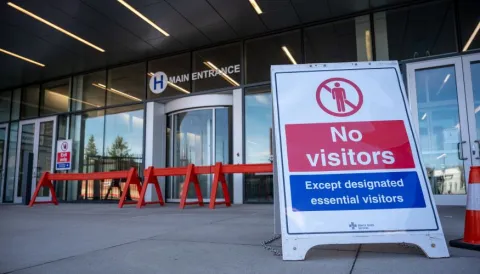iPads-on-wheels connect hospitalized COVID-19 patients with loved ones

When nurse Jenifer Tabamo saw how lonely some of her patients were in hospital, she knew she wanted to do something to help them stay connected to the outside world.
Tabamo, a UBC nursing double alumna who works as a clinical nurse specialist at Vancouver General Hospital (VGH), decided to get creative, turning to technology.
Specifically, iPads. On wheels.
She and a team of experts worked to attach iPads to an articulated arm connected to repurposed hospital equipment so the devices would be more accessible to patients in hospital beds. The result? A simple way for patients to video chat with their family and friends, play videos, games, and music—all while alleviating feelings of loneliness, boredom and social isolation.
Tabamo worked with the GF Strong Rehabilitation Centre’s assistive technology department to examine how to make the iPads more accessible for patients such as assessing various articulating arms and determining which one is best for the devices to be attached on – a requirement for bed bound patients. The Vancouver Coastal Health biomedical engineering team also helped to make the iPads portable, mobile and safe for patient use.
“We decided to recycle old, unsalvageable medical equipment such as vital signs machines and bladder scanners and bring new life and purpose to them,” Tabamo says. “An added bonus is that the point-of-care staff are used to maneuvering and using these devices and therefore required minimal time for additional training and orientation.”
Tabamo originally came up with the idea for bringing iPads into the acute care units at VGH in June 2019. She drew inspiration from Lillian Hung, a fellow VGH clinical nurse specialist and UBC nursing clinical assistant professor who led a similar program to help patients with dementia.
After the COVID-19 outbreak hit, the need for iPads-on-wheels has never been greater. Currently, there are four iPads-on-wheels in circulation, with an additional three on the way.
“Because of the current pandemic demanding physical distancing, many acutely ill patients are isolated in their rooms with no visitors allowed,” says Tabamo. “Thanks to the iPads-on-wheels, we have an easy way for patients to stay connected and feel more comfortable.”
Since it launched, Tabamo says the program has been very popular amongst patients and hospital staff alike.
“Once, we facilitated a videoconference for an elderly patient and 15 family members from around the world and they all sang and prayed together,” she says. “After the chat, her family expressed repeated gratitude and the patient was also smiling from ear-to-ear and told us we had made her day.”
“Our staff have also been thankful as they now have a tool that helps facilitate person-centred and compassionate care for their patients and they are happy that they are making a difference in their patients’ lives.”
A nurse for 19 years, Tabamo says she is grateful the iPad-on-wheels program has received so much support and that it has been impactful to patient care. She hopes to continue advancing nursing practices in her role as a clinical nurse specialist and pioneer initiatives to support quality and safe patient-centred care.
The program was supported and funded by VGH, the VGH Medicine program and the VGH & UBC Hospital Foundation.


